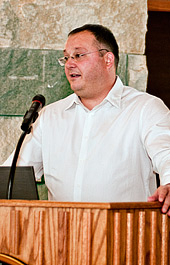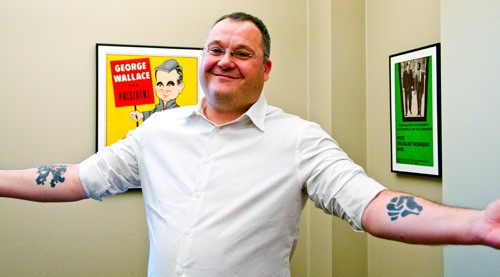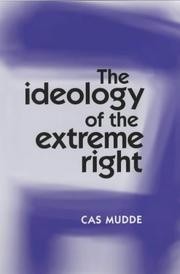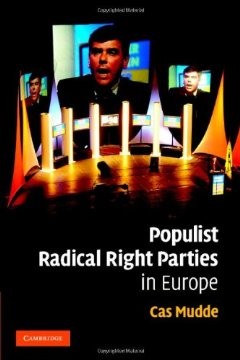 Despite only having been in the United States for a few years, Cas Mudde can rattle off recent election results with the finesse of a network news correspondent. It helps that Mudde, the Nancy Schaenen Visiting Scholar in Ethics and visiting associate professor of political science, is an expert on right-wing politics, especially during the hard-to-starboard shift of the 2010 American midterms.
Despite only having been in the United States for a few years, Cas Mudde can rattle off recent election results with the finesse of a network news correspondent. It helps that Mudde, the Nancy Schaenen Visiting Scholar in Ethics and visiting associate professor of political science, is an expert on right-wing politics, especially during the hard-to-starboard shift of the 2010 American midterms.
Mudde came to DePauw this summer from University of Notre Dame's Helen Kellogg Institute for International Studies, where was a visiting fellow for a year. Before arriving stateside in 2008, he spent a decade studying Europe's radical right parties at universities in Belgium, the Czech Republic, Hungary, Scotland and his home in the Netherlands.
He has published widely on topics such as political extremism,
democratization in Eastern Europe, civil society, and Euroskepticism. His most recent book is Populist Radical Right Parties in Europe, which won the Stein Rokkan Prize for Comparative Social Science Research and was named a Choice "Outstanding Academic Title." Among his other publications are the co-edited mini-symposium "The Numbers We Use, The World We See" in Political Research Quarterly; the co-edited special issue "Deviant Democracies: Democratization Against the Odds" of Democratization; and the edited volume Racist Extremism in Central and Eastern Europe.
But Europe doesn't share the United States' political landscape. Students in Mudde's first-year seminar, Radical Right Politics in Europe, learn a political language filled with new directional connotations. Outside of America, what is right and what is left?
For example, Mudde explains, "Europeans had bizarrely favorable views toward Obama. We had Social Democrats and even Greens supporting Obama, whereas in much of Europe he would be considered center-right."
Or, on how the Tea Party movement, formed in the wake of the 2008 election, compares to populist movements overseas: "The idea of a small government really isn't that popular in Europe," Mudde says. "Most populists there actually support a fairly well-developed welfare state. In Europe, the key issue has been nativism. So, you have very different ideologies, even though both can be considered right wing."
Next spring, Mudde will teach a course based on his current research. Liberal democracies often face the dilemma of having to defend themselves from extremism without undermining their core values. Does our Fifth Amendment's Due Process Clause apply to terrorism suspects? How is it possible for a free society such as Germany to ban Nazi paraphernalia? Answers to those questions don't come without debate.
"Some of the actors who have challenged liberal democracies truly are anti-democratic," Mudde says. "They can be violent or non-violent, and some are pro-democratic. Nevertheless, they all create repression. I want to look at where the boundaries should be."
This semester, Mudde organized Cinema Oi!, a film series about one such group, known globally as skinheads. The films, however, weren't his introduction to skinhead counter-culture – his body is marked with signs of membership.
For Mudde, being a skinhead was about being part of a social scene. It meant that you liked a certain type of music – ska or Oi!, a type of street punk – and wore the right clothes. Political beliefs were never the allure, but they would end up pushing Mudde out.
"At a certain point in time, because of developments in the Netherlands, 'skinhead' became associated with 'neo-Nazi,' even though the majority of skinheads were not," Mudde says. "I felt that my struggle to be the last liberal skinhead was not really worth it."
Today, much of what constitutes political discourse affirms Godwin's Law, the observation that the longer something is discussed, the more likely it will end with a comparison to Adolf Hitler or the Nazis. But having been in the presence of radicals who unabashedly carry that banner, Mudde says the rhetoric goes too far.
"Lewis Black called it 'Hitler Tourette's,' and it has gone both ways," Mudde says. "Neither Obama nor Bush is anything like Hitler. If you had a little bit of an education, you'd be ashamed to say that."




 > Aanvankelijk bestudeerde Mudde het rechts-extremisme van de jaren tachtig en
> Aanvankelijk bestudeerde Mudde het rechts-extremisme van de jaren tachtig en > 'Voor een deel is populisme geen probleem. Kritiek is goed. Het is goed dat
> 'Voor een deel is populisme geen probleem. Kritiek is goed. Het is goed dat
 del.icio.us
del.icio.us
 Digg
Digg
Les commentaires sont fermés.